BLOG
Find support not just for emotional eating, but all aspects of your well-being.
Supporting Your Mental Health at Work
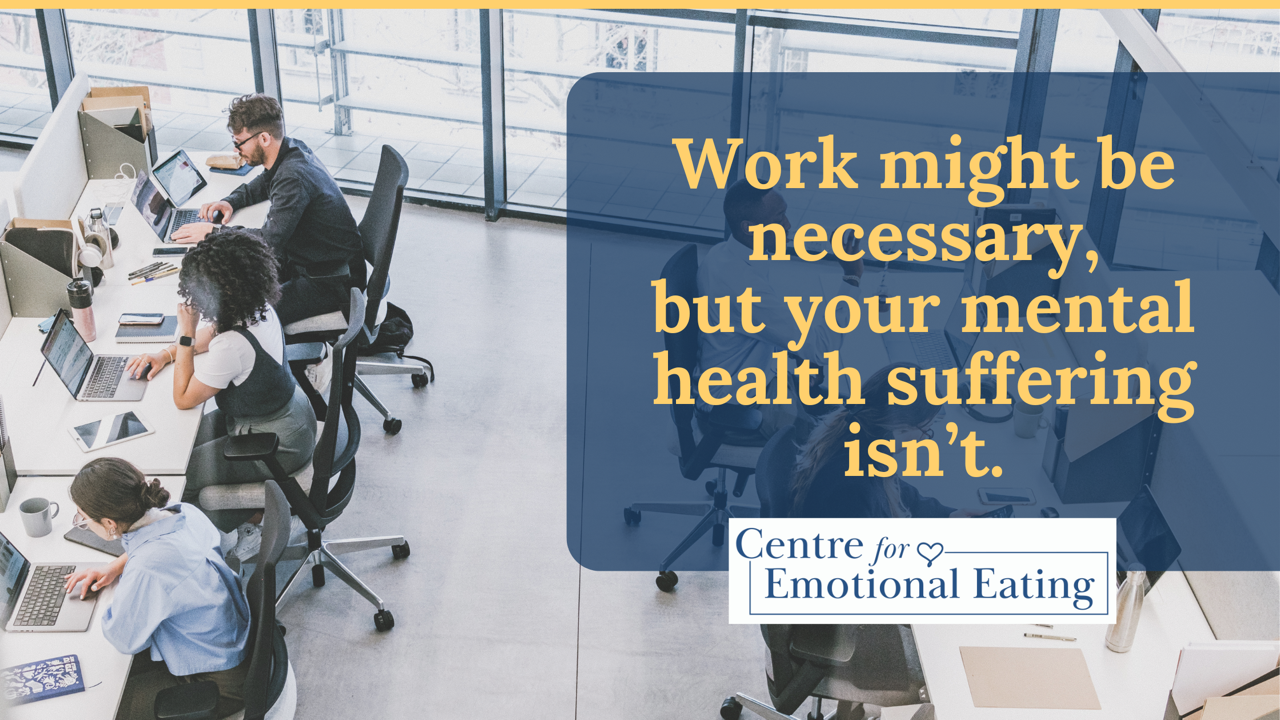
No matter what you do for work, chances are it is a stressor in your life. Even if you enjoy your job, there might be tasks or colleagues you’d rather not deal with. Work is a necessity not just for income, but also purpose, goal setting, community, and future planning.
That doesn’t mean it isn’t stressful.
Below are a number of ways you can support your mental health as a worker.
Basic Maintenance Goes a Long Way
You might already know that routines, rituals, and structure can support your well-being, so focusing on identifying working hours (and rest or play hours), practicing good sleep hygiene, and implementing boundaries around your work phone or logging in can be incredibly helpful for supporting your mental health. It can also be helpful to create a transition ritual where you let your nervous system know that you are changing from work you to home you. Listen to a meditation app on your commute or change clothes as soon as you are home. These can signal to your body that it...
Why You Dread Being Bored

Our modern society keeps us hustling: from work to parenting to errands to all kinds of activities. We’re taught that there is value in keeping busy, that being productive should be celebrated. We also are constantly bombarded online with content that highlights people having it all together, going on their next vacation, workout out at 5:00 a.m., or getting a promotion. You feel you have to keep doing to keep up!
And being busy can be a coping mechanism too.
There are a number of reasons you might keep adding to your to do list. First, keeping your mind constantly focused on what you have to do next stops you from having any space to think. It becomes an avoidance tactic that keeps you from feeling or thinking about what you don’t want to. Ever notice when the chaos of the day ends—driving home from work or after the kids are in bed—you end up reaching for food? That’s because constantly being busy is an avoidance tactic just like emotional eating. You can rely on food when your day...
Reparenting: Learning to Support the Younger You
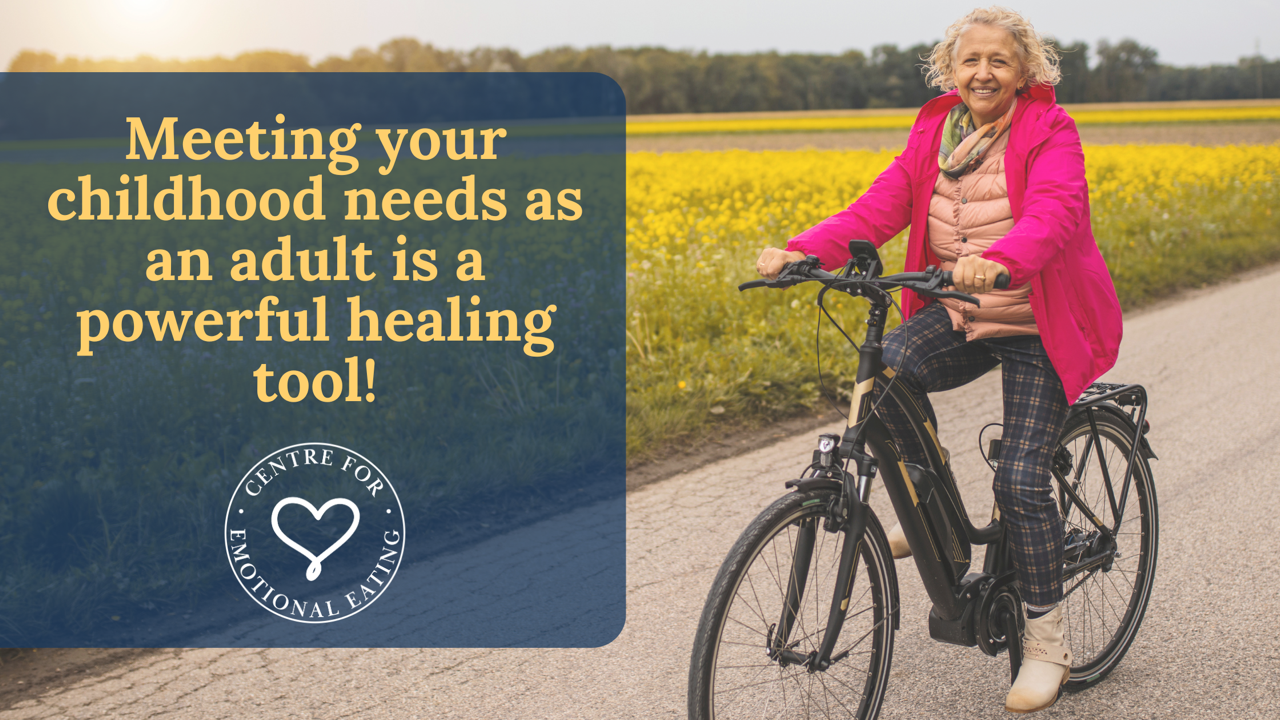
Often here at the Centre for Emotional Eating we talk about how your patterns and habits with food are influenced not by the cravings themselves, but the root cause behind what makes you act.
For many, the root cause can be found in childhood or adolescent experiences. This is because as our brains and bodies grow, we are learning and are influenced by examples displayed around us—to finish what’s on our plate, diet talk, stuffing down emotions, just to name a few. We learn from parents, caregivers, teachers, coaches, siblings, and friendship circles! But not all of these lessons will serve you as you grow into your own adulthood, some might be downright painful or destructive.
It is incredibly common to reach a point in your adult life and know things need to change but not know how. This is where therapy can be a very helpful tool in helping you sort through your thoughts and feelings, gain confidence to make your own decisions, and help you feel more resilient.
And one effective ...
Summertime Depression: Seasonal Affective Disorder is a Year-Round Experience

You might have heard of, or experienced, seasonal affective disorder (also known as SAD) during the colder months of the year. Common symptoms of SAD are irritability, changes to your sleep patterns or the way you eat, and worsening of anxiety or depression. If you’re reading that and thinking “that sounds familiar” but it is the Summer and you dismiss your symptoms, we’re here to tell you that SAD can also happen during the sunnier, warmer months.
Our brains and bodies like routine: it makes things feel in control and predictable. So, any time there are changes introduced—like hotter weather, later sunsets, or change to homelife—it is understandable that our system would react in a certain way, no matter if it is Winter or Summer. There are a number of reasons why Summer SAD can happen, but here are two big ones:
Day-to-Day Disruptions
You might be planning vacations (hello travel stress!) which can add to your mental load or are having to navigate having kids home on school break....
Emotional Eating Toolkit: Creating a Comfort Box
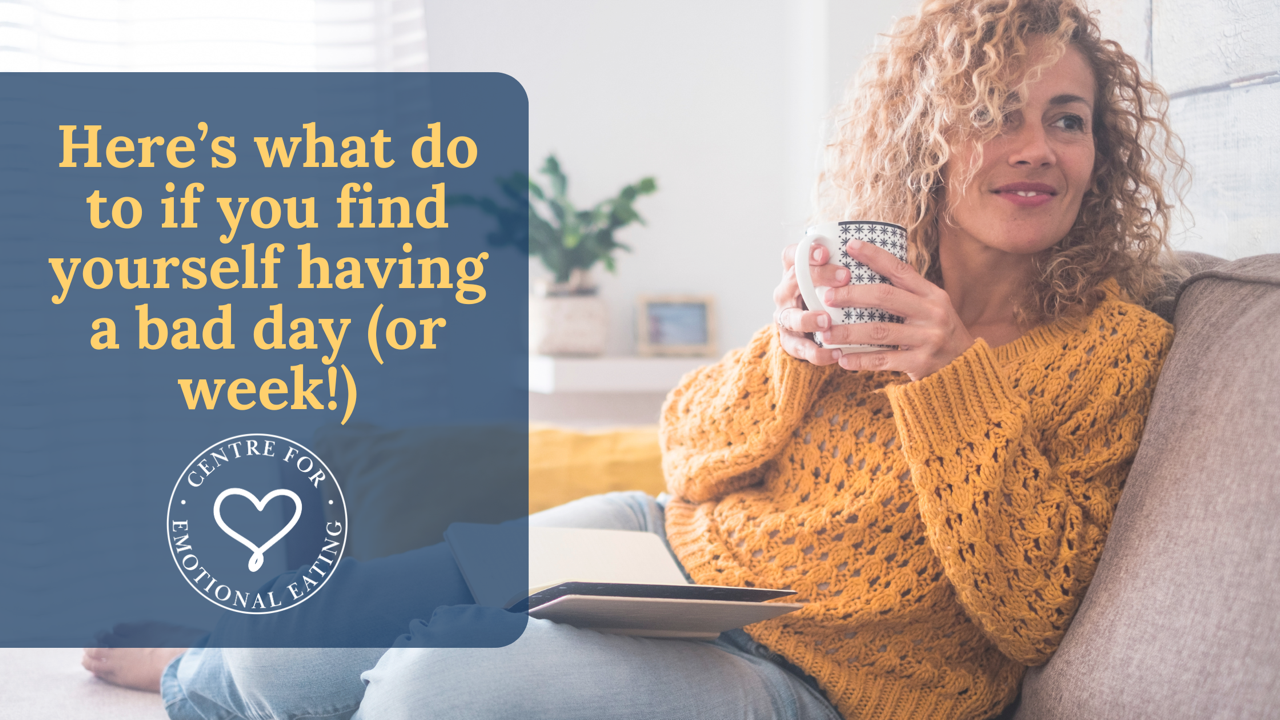
We all have bad days (heck, even weeks!) where we feel drained, angry, or even upset most of the time. If this comes up for you, it is time to create a comfort box. This can be a great resource to build yourself back up when you’re feeling low.
Here’s how to do it:
The next time you’re feeling in a good place, put together a physical box or digital list that has things that bring you comfort when your mood is low. You can include:
- A playlist or movie that lifts you up (or helps you cry). This could be either to pump up your energy or create an emotional release. It can sometimes be difficult to allow ourselves to cry when we’ve been holding it together for so long; we often judge ourselves less when we’re crying over a fictional character.
- A candle you’ve always wanted to burn or a face mask you’re wanted to try. Often, we keep certain things for a “special occasion”, but why wait! Being able to indulge in little luxuries might just give you the small boost you’re looking for (in ...
How to Build Trust in Yourself
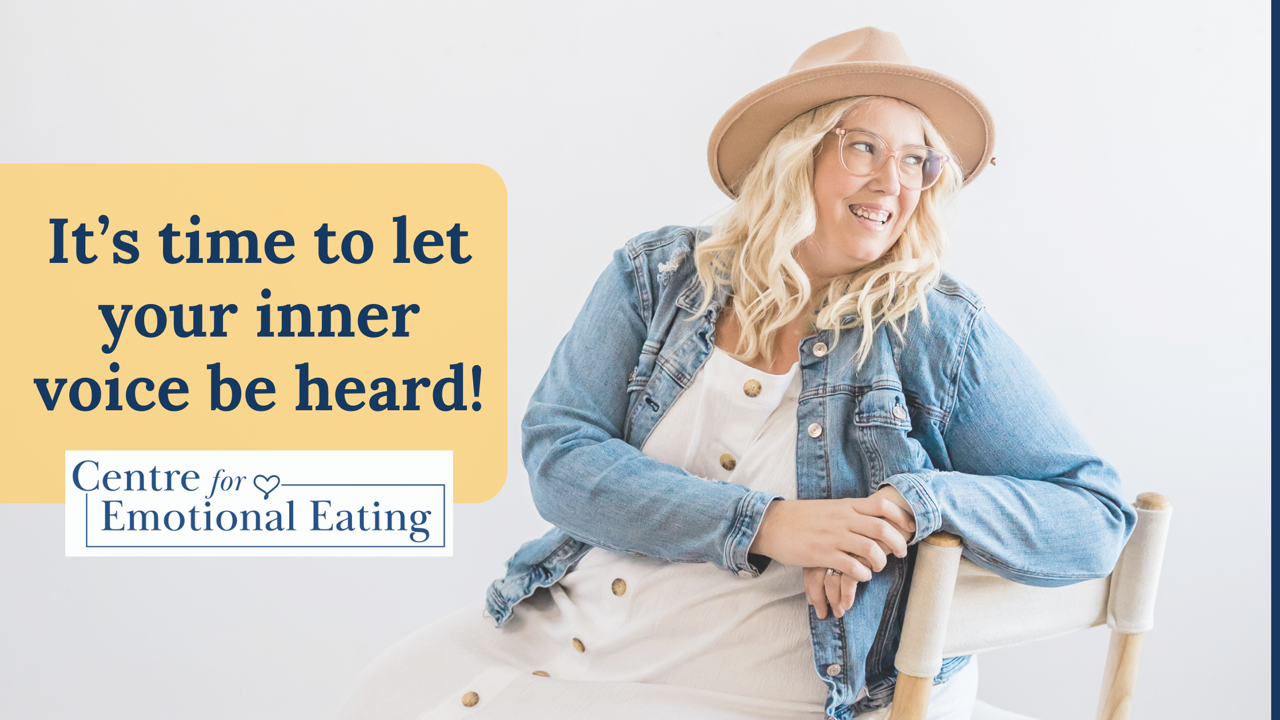
If you’re an emotional eater, you might have spent a lot of your life trying to stick to a diet or workout routine created by someone else only to keep feeling like you fail. This can grind down your sense of self-trust: you keep trying to live by the rules of others, not trusting your inner voice, and you keep feeling like you’re breaking promises to yourself by not following through.
Talk about being stuck in a loop!
It is time to start rebuilding your self-trust, an inner knowing that you are capable and have preferences. But how can you do that if you’ve been ignoring your inner voice for so long? Try thinking about how you support the people in your life who you love and then apply it to yourself. You might find that it feels easier to trust and show up for others than it is to show yourself the same level of support and compassion.
Here are a few specifics to think about:
Keep a promise to yourself. Start off with little things like setting the intention to brush your teeth b...
Why We Engage in Self-Sabotage Behaviour
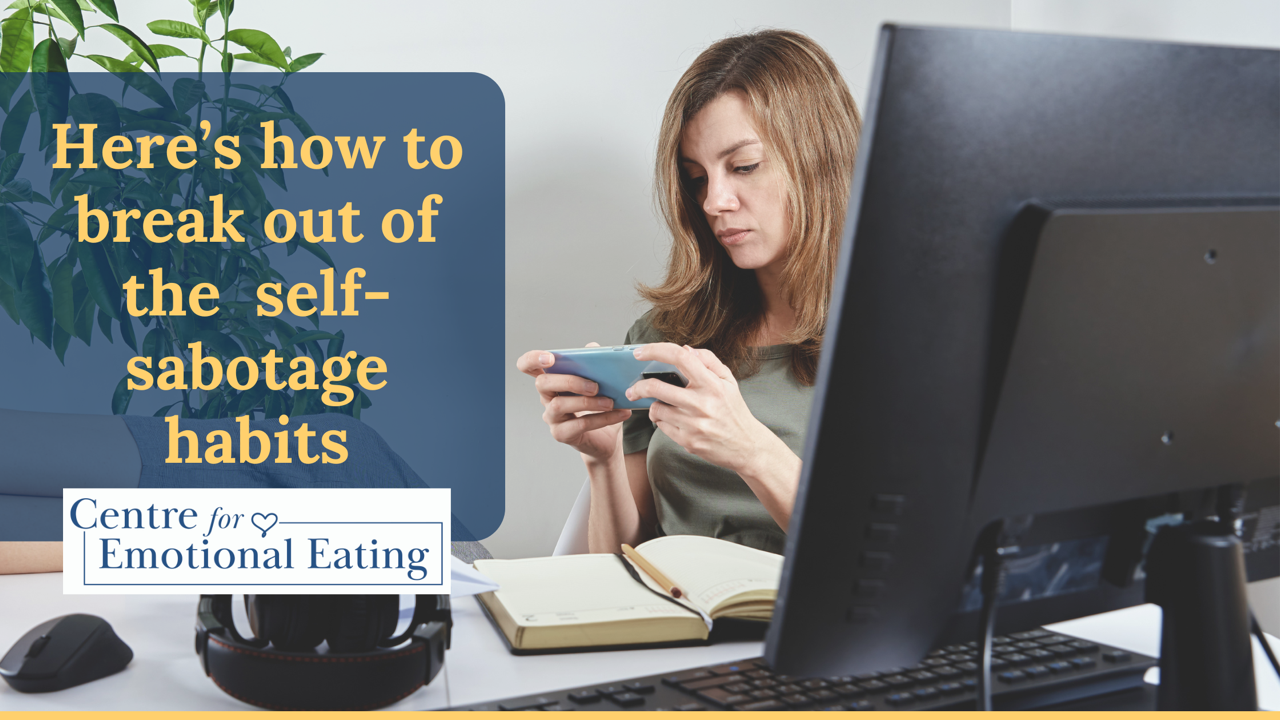
Self-sabotage is a sneaky habit that is getting in the way of, well, yourself! You might have recognized your patterns, even be aware it doesn’t make you feel good, but feel helpless to stop the action. Self-sabotage keeps you feeling stuck because there is familiarity in the outcome. Yes, it might leave you feeling shame or overfull but it feels safe.
Self-sabotage behaviour can look like:
- Perfectionism. Needing everything to be perfectly aligned and ready before taking action. But the truth is “perfect” doesn’t exist, meaning you’ll never end up taking that step forward.
- Procrastination and avoidance. It is easy to pick up our phones and scroll or focus on what foods we want to binge on as a way to numb out rather than face something.
- Constant self-doubt and criticism. This can be feeling like you never measure up or that you can’t possibly meet your goals, so why even try.
These patterns of self-sabotage show up not just around a fear of failure, it can also come up as a fe...
Welcome Spring with these Insightful Journal Prompts

There is no denying that springtime is a season of renewed positive feelings, like hope and joy. More daylight hours, warmer sunshine, and the ability to crack the windows refreshes us. There is something about shedding puffy winter coats and clunky boots that also allows us to feel lighter—in all the senses of the word!
If you are someone who feels as if they are waking up at this time of year and aren’t sure where to put your rising energy and good mood, below we’ve got some great questions for you to reflect on!
Choose one—or play around with all of them—and get inspired to look inwards. Getting clarity can help you feel more in-tune with what fills your cup and is a great way to not only recognize your needs, but meet them. This practice makes you feel more fulfilled, meaning you’re less likely to reach for food to soothe yourself.
- If your mood is feeling more positive this season, what is it that is creating this mental shift? How can you do or get more of it? What else in yo ...
Client insight: “Emotional Eating is my Comfort… And it’s Comfortable”

After working with emotional eaters for more than a decade, it is common to hear from clients that they don’t understand why they keep emotionally eating when it makes them feel terrible.
They can’t stand the overfull feeling after a binge.
They hate hiding from others and sneaking food.
They judge their worth by thinking they need more willpower to get their shit together.
They dread the judgement, guilt, and self-hatred that comes after eating.
They’re ashamed of how much money they spend on food.
For something that is supposed to bring a sense of comfort, these things sound like anything but! So, why are you stuck in this emotional eating cycle when you know it doesn’t feel good? It isn’t about cravings for specific foods or an “addiction to sugar.”
It is because emotional eating is familiar. It is the predictability, even the negative side of it, that offers you a sense of comfort. You know what to expect and our brains are wired to go with what we know. Yup, even when what ...
Do You Have a New Year’s Resolution to Lose Weight?
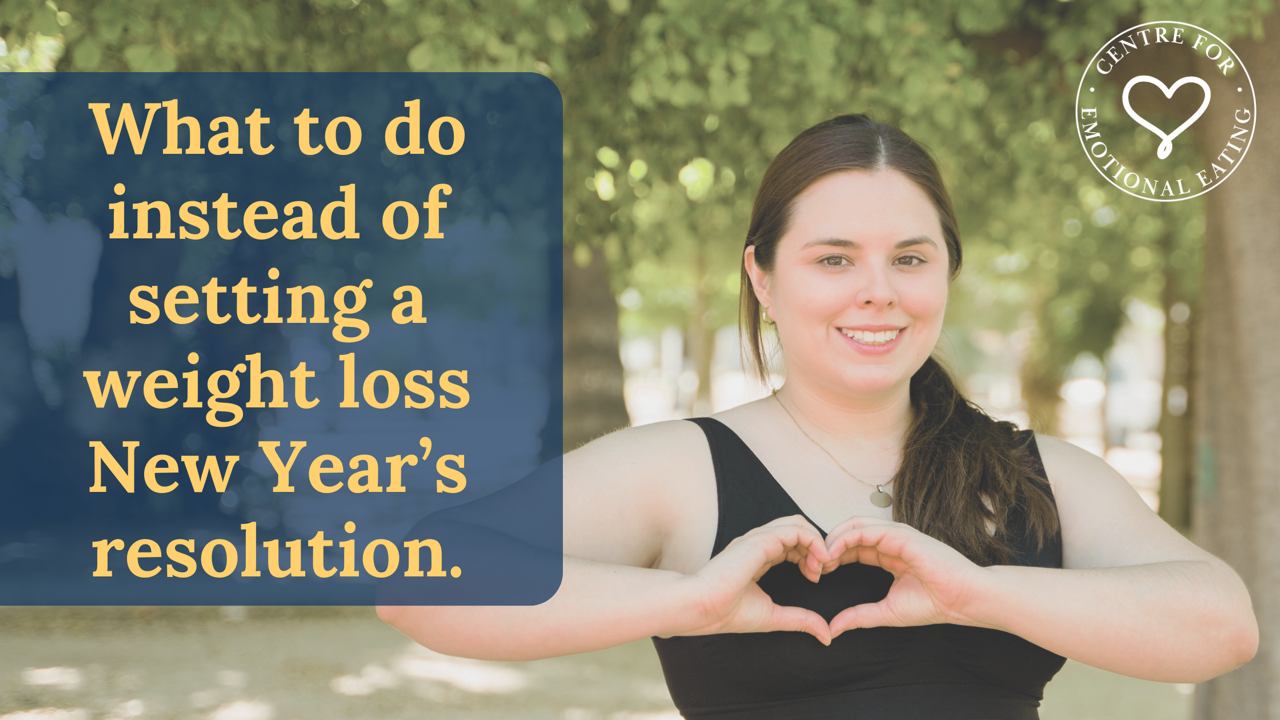
Every January we see more and more messaging about a New Year diet, cleanse, or detox. As a society, we’re pretty vulnerable after holiday celebrations in December that it feels like a given that we should restrict and punish ourselves when the calendar flips to the new year.
If you’ve been caught up in this experience, know you are not alone. New Year’s resolutions to lose weight are incredibly common. But have you ever stopped to think about how this need to diet comes back around *every* year? That means it isn’t working in the first place! This is the truth behind diet culture: it wants to keep you feeling negative about yourself so you keep buying the new plan, app, or book because it keeps them in business.
If you’re tired of yo-yo dieting and constantly feeling bad about how you look, we have 3 things you can add to your routine that won’t make you feel like you’re failing. This is the opposite of a new diet that takes away things you enjoy, telling you to give up carbs or tha...


